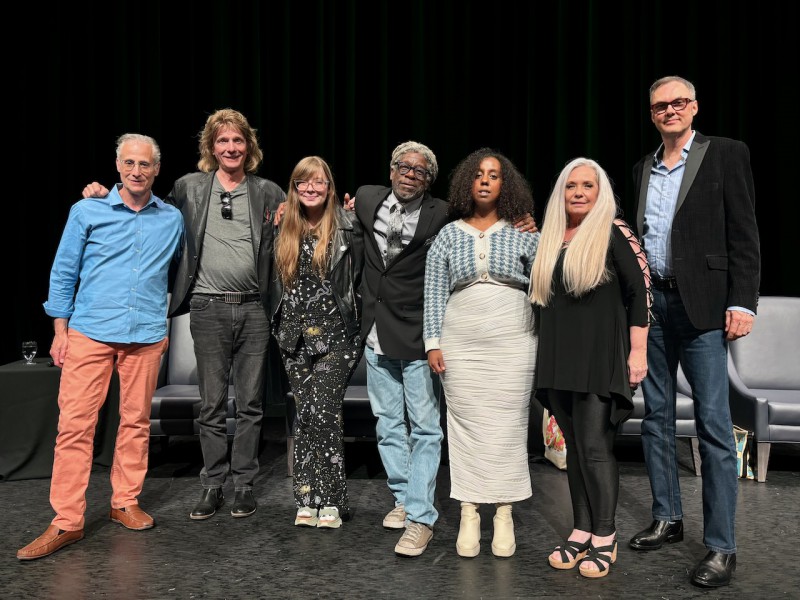Vic U’s Centre for Creativity Co-hosts Panel on Helping Young Artists

Howard Kerbel, Gil Moore, Aline Homzy, Michael Williams, Xeynamay Gezahegn, Sandy Horne and Gregory Newsome on stage during a panel discussion at the Isabel Bader Theatre on the challenges faced by Toronto’s emerging artists.
Story and photos by Joe Howell
Does Toronto risk losing the next generation of musicians? Music industry insiders discussed that question on June 27 at a panel discussion at the Isabel Bader Theatre, held in partnership with Victoria University’s new Centre for Creativity and TD Toronto Jazz Fest.
Hosted by Michael Williams, a Juno-nominated music producer and former MuchMusic VJ, attendees heard from Gil Moore (owner of Metalworks Studios and member of the band Triumph), Sandy Horne (bassist of Spoons), Professor Gregory Newsome (U of T Faculty of Music), Xeynamay Gezahegn (It’s OK*) and award-winning violinist Aline Homzy on the future of music in our city. The panellists shared their personal journeys and reflected on the challenges faced by young artists in Toronto today—and what can be done to help them succeed.
The event was the first to be hosted by Victoria University’s new Centre for Creativity, which launched in May as an outgrowth of the Creativity and Society program. “The idea of the centre is to create programming, events and spaces where creative people from different disciplines can encounter each other and learn from one another,” said Professor Adam Sol, the centre’s launch director and co-ordinator of the C&S program.

The panellists identified various difficulties confronting emerging artists, including the loss of places to rehearse and perform, the breakdown of traditional routes to wider recognition, a lack of support for early education in music and an increasingly fractured media landscape.
Moore said the ecosystem for unestablished musicians is under stress. When he was a teenager, “we had lots of places to play, like dances at high schools and churches. You could get the gig even if you weren’t very good—and most of my bands weren’t very good when I started. That feeder system led to playing the clubs when you were a little older, a chain which I think is now under a lot of pressure.”
Professor Newsome agreed. “It’s that incubation space,” he said. “Space to rehearse but also to get in front of people, which is really important. These spaces are getting bought up and turned into condos. I know that’s a cliche, but where do young people go now to get some of those experiences?” Newsome said that the University of Toronto’s Walter Hall auditorium, which offers space for public recitals by undergraduate, master’s and doctoral students, is “basically booked every single day.”
Several panellists highlighted the need for more music education. “I think the failure lies in our governments pulling away funding for music programs at the elementary school level,” said Homzy. “Young people are not exposed to instruments; they’re not exposed to that experience or feeling of what live music is.” She pointed to the impact of Venezuela’s publicly funded El Sistema program in introducing young people to music performance and the benefits it brought society.
That need for more education doesn’t end after childhood. Gezahegn said that in her unfiltered conversations with young artists, “they’re very honest about how they don’t know what to do. They don’t know how to get to a venue and plan a show, or how to promote it when there are a million shows happening. There are a million things promoted on Instagram or TikTok and they can’t get through the noise.” The challenges are especially pronounced for BIPOC artists and people who “don’t have a traditional path of going to university for music,” she added.
The financial struggles of young artists was another shared concern. “Eating is something many of us have grown accustomed to doing three times a day,” said Williams. “If you’re a musician, you have to like the music more than you like food,” he joked. Homzy said society must advocate for better payment of artists: “It’s often assumed that we do it because we’re passionate about it, which is true. But we also need to be sustained by money.”
The discussion ended with a lively and wide-ranging Q&A session, in which audience members asked about everything from the role of AI in the arts to how to define “creativity.”
Professor Sol, who thanked the participants and audience for joining on behalf of Victoria College, said the Centre for Creativity looks forward to hosting more events like this one in the future.
The Victoria University Centre for Creativity is a new initiative whose mandate is to host cross-disciplinary programming and events, inviting artists, thinkers and developers from different fields to share work, compare ideas and collaborate. Bookmark the centre’s webpage for more info on upcoming events as they’re announced. Visit here to learn more about the Creativity and Society minor program, open to all U of T students in the Faculty of Arts & Science.
